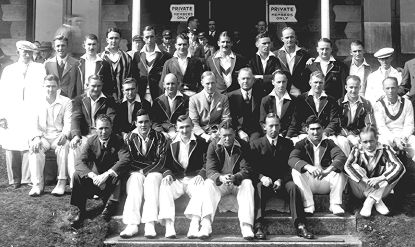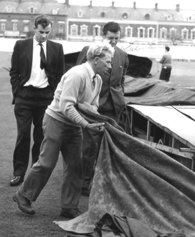Prior to the end of the 20th century four Australian teams had played at North. In 1880, the second team to tour the UK had great difficulty in arranging fixtures but North, enterprisingly, took advantage of the situation and a game was arranged against XVIII of NICC. Cricket historians might be interested in some of the names who took part. FR Spofforth, the "Demon", who took 17 wickets in a nine wicket victory, WL Murdoch, JMcC Blackham and the big-hitting GJ Bonnor. This team also participated in a Test match, the first ever in England, but was beaten by five wickets.
The next visit did not take place until 1938. The captain of this team was Don Bradman but, owing to an injury sustained during the final Test, he was not with the party at Ormeau when they played against Ireland, and the side was led by Stan McCabe. It also included Bill O'Reilly, rated by some as the greatest of all bowlers.
 Ireland v Australia at Ormeau, September 1938
Ireland v Australia at Ormeau, September 1938(Back Row) WJ Baxter, W Spears, CW Mellon, HR Morgan, CE White, E Billingsley, L Fleetwood-Smith, TJ McDonald, WJ O'Reilly, R Cuffe, M Waite, N Petts, E McCormick
(Middle Row) E Ingram, S Barnes, T McMurray, S McCabe, DC Lindsay, W Jeans, J McDonald, B Barnett, H lambert, JH Fingleton
(Front Row) CW Walker, JS Pollock, EN Larmour, WA Brown, AL Hassett CL Badcock, EDR Shearer
At the end of a long and tiring tour Australia still defeated Ireland easily. Batting first, they were all out for 145, McCabe, Badcock, Barnes, Brown and Waite being the main contributors. For Ireland, excellent bowling by James McDonald and Eddie Ingram gave them figures of 5 for 24 and 4 for 46, respectively. In reply, Ireland could not cope with O'Reilly and Ward and were all out for 84.
After a twenty three year gap, the Australians returned in 1961, captained by Richie Benaud, and again at the finish of a demanding tour. The team at North included household names such as Neil Harvey, Alan Davidson, Norman O'Neill, Bob Simpson and Graham McKenzie. Neither they, nor anybody present, is ever likely to forget this game. On the first day rain delayed the start until 1.30. Batting first, the Australians were dismissed for 209. This represented a fine Irish performance, with Gerry Duffy taking 6 for 29. O'Neill was top scorer with 85. At close of play Ireland were 72 for eight.
 Captains Alec O'Riordan (left) and Richie Benaud wait for groundsman Bob Collins to remove the covers before the match.
Captains Alec O'Riordan (left) and Richie Benaud wait for groundsman Bob Collins to remove the covers before the match.
When stumps were drawn Ireland's second innings has reached 136 for 8. This was largely against the second-string bowlers, Benaud himself keeping wicket. Herbie Martin made 57 and the match was drawn.
In 1968 Australia sent a relatively young and inexperienced team to England. The Test team was in a period of transition and many big names had retired. In spite of this they drew the Test series. The touring party, led by Bill Lawry, had two highly-rated young batsmen in Doug Walters and Ian Chappell, soon to be captain of one of the greatest of all Australian teams. Of these three, only Walters played in the one day game at North, where the team was led by Graham McKenzie.
Australia batted first and had lost four wickets for 83 by lunch, three of them to Dougie Goodwin, whilst the dangerous Walters went early to Dermott Monteith. The batting mainstay was Ian Redpath with 57 and, later, all-rounder Eric Freeman hit hard to reach 70 in little over an hour. The innings closed at 213, Goodwin's skill and persistence, giving him figure of 5 for 68.
The Ireland innings began disastrously, McKenzie taking a wicket with his first ball. From then on Ireland could find no answer to spinner John Gleeson, who captured 6 for 24, and were all out for 92. Thus Australia were victors by 121 runs on the last occasion that they played at the famous Belfast ground.
